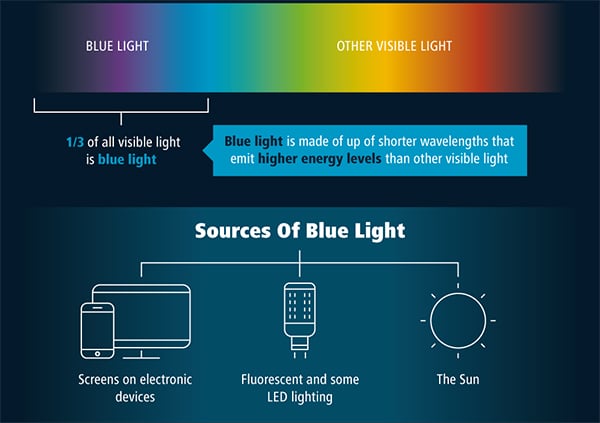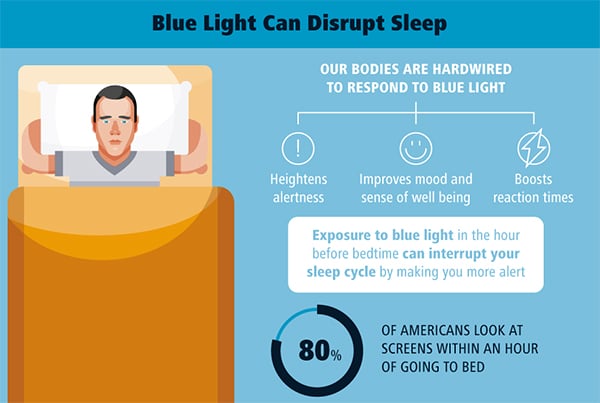By Laura Bollinger, RDN
Winter is in full effect and our daylight hours continue to grow shorter and shorter as well as colder and colder. A warm blanket is so inviting! It is tempting to stay inside snuggled up under that blanket with the lights on watching television or playing games on our phones and tablets well after the sun has gone down.
While it is likely we have all done this from time to time, it may not be the best routine for your health. This routine increases your exposure to something called blue light.
You may have heard that the blue light from your phone is damaging your eyes. But would you believe that phones are not our primary source of blue light exposure? If you’re thinking computers are the main source you’d be wrong again.
Most of our exposure to blue light actually comes from the sun. We are also exposed to blue light from fluorescent lights, CFLs (compact fluorescent lights), and LEDs (light-emitting diode) in our homes, offices, and street lamps. These energy-efficient lights tend to produce a much brighter light than less efficient incandescent lights.
Before we sound the panic alarm, let’s learn more about blue light and its effects.
What is it?
Blue light refers to light that has a short wavelength. When this short wavelength light hits our eyes it can penetrate through the cornea and the lens to reach the retina.

This short wavelength light stimulates the brain, reduces melatonin secretion, and increases adrenocortical hormone production. These reactions to blue light signal the human body that daylight has arrived and it is time to wake up. As blue light from the sun fades with the sunset the opposite reactions occur, allowing us to sleep during the dark hours of the night.
With the advent of modern artificial lights, many places around the world are lit up with a glow all night long. This glow can interfere with our natural sleep and wake cycle known as the circadian rhythm. Blue light in particular acts as a stimulus, waking up our brain and disrupting the circadian rhythm making it harder to fall asleep.

Research is ongoing regarding damage blue light may cause to our eyes. Mostly what we feel after looking at screens for long periods is likely digital eye strain. This is caused by the tendency to stare at the screen without blinking resulting in dry, strained eyes.
You might find it surprising to learn that blue light actually has some benefits such as decreasing nearsightedness in children and maintaining mental performance. While it’s certainly important to protect our eyes from excess sun exposure, we don’t want to entirely eliminate our blue light exposure.
How to Protect Yourself
The American Academy of Ophthalmology currently does not recommend any special eyewear for computer use. While it is too early to recommend the variety of equipment that claims to protect against blue light’s harmful effects, there are ways you can take precautions.
Instead of purchasing questionable eyewear, try these steps to protect your eyes:
- Take screen breaks. Follow the 20-20-20 rule. Every 20 minutes, look 20 feet away for 20 seconds
- Start minimizing or eliminating your screen time in the 2-3 hours prior to bed
- If you must use devices that emit blue light before bed, use “night” or “dark” settings to reduce blue light exposure
- Dim your house lights in the hours before bed
- Opt for red-toned night-lights as these are the least stimulating to the brain
- Use light-blocking or room-darkening curtains or blinds
Winter Woes
With shorter daylight hours during the winter months, it can be tempting to keep your house brightly lit well into the evening. Instead of using bright lights that continue to expose you and your family to blue light wavelengths, dim your lights or shift to lights that produce warmer colors such as pink or red. This reduces the likelihood that your circadian rhythm will be disrupted.
Remember that light tells the brain to stop producing melatonin. If you’re taking melatonin at night trying to improve your sleep, consider reducing evening light and screen exposure to allow your natural sleep and wake cycle to support better sleep.
There are plenty of ways to spend the evening indoors without screens:
- Read a (paper) book
- Write in a journal
- Play a board or card game
- Bake breakfast cookies or baked oatmeal for the morning
- Make a craft such as a winter wreath or Christmas tree ornaments
- Make a family scrapbook
- Do crossword puzzles, word searches, or Sudoku
Reset Your Routine
Talk to your family. Create a plan to reduce screen time and dim the lights in the hours before bed. It is important to involve the whole family in the plan in order for it to be successful. Together, choose the best schedule for everyone. Choose a time to turn off your screens including phones, computers, and TVs.
Times may vary for individual family members, but keep everyone on the same schedule as much as possible. Consider mapping out a schedule of the activities your family will do instead of looking at screens. Allow each member of the family to choose an activity so everyone feels involved and is much more likely to follow the new routine.
Transitioning to a “screenless” evening may not be easy, especially if the habit has been to stare at screens right up until the moment you fall asleep. Try to make it as smooth and enjoyable as possible for the whole family.
For most Americans, more hours and better quality of sleep can do more than just protect our eyes. Adequate sleep can improve mood and productivity, as well as reduce the risk of weight gain and weight-related metabolic conditions.
Spend less time staring at screens and spend more time staring into the eyes of those you love. This way you can worry less about your exposure to blue light and cultivate strong and loving relationships.





